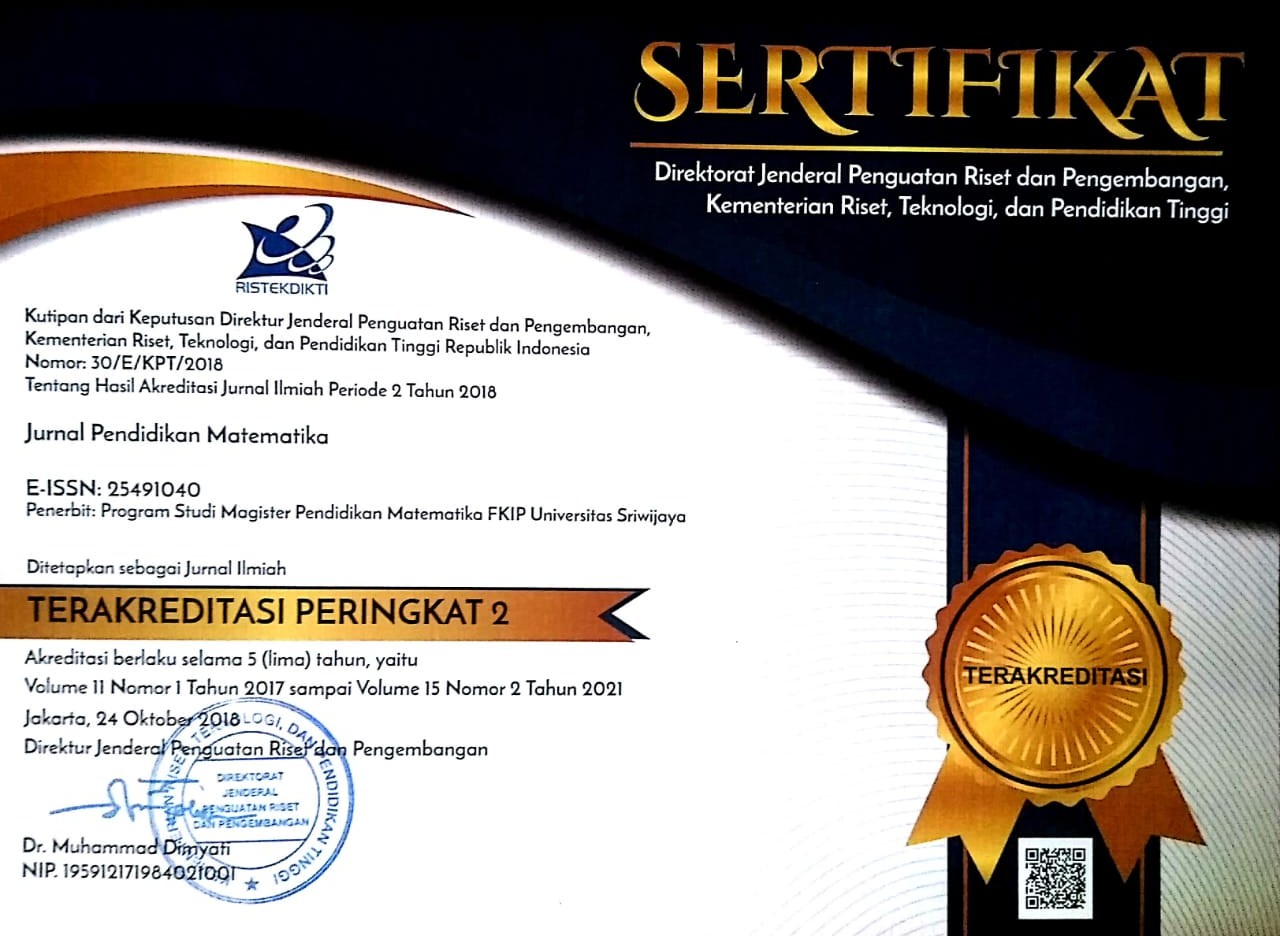An Analysis of the Ability to Understand Mathematical Concepts of Middle School Students in Completing Integer Operations
Abstract
Understanding mathematical concepts is a crucial skill for students to possess because it will make it easier for students to learn and master concepts in mathematics. This study aimed to describe the ability to understand mathematical concepts of junior high school students in solving integer arithmetic operations. This type of research was descriptive qualitative. The subjects in this study were seventh-grade students in one of the public junior high schools in Purworejo district in the 2020/2021 academic year with a good understanding. The technique of selecting the subject was purposive and snowball. The data analysis technique employed was the analysis technique of Miles & Huberman; data reduction, data presentation, and conclusion drawing. The results of this study indicated that students' understanding of mathematical concepts in completing arithmetic operations were as follows; students could restate a concept in writing, students could provide examples and not examples of a concept they have learned, students could use and choose certain operations in solving mathematical problems, students could not present concepts in the form of mathematical representations in the form of pictures, students could not classify objects according to certain properties according to the concept, and students could not apply the concept algorithmically to problem-solving.
Keywords
Full Text:
PDFReferences
Afifah, I. & Sopiany, H. N. (2017). Analysis of the ability to understand mathematical concepts of junior high school students in contextual-based mathematics learning [in Bahasa]. Proceedings of the National Seminar on Mathematics and Mathematics Education (Sesiomadika) FKIP Universitas Singaperbangsa Karawang (Unsika).
Alfiana, F. (2015). Analysis of the Ability to Understand Mathematical Concepts of Class VII Students Junior High School Build On Integer Matter [in Bahasa]. Accessed from http://repository.ump.ac.id/2228/, on June 12, 2021.
Anggraeni, F. (2016). Analysis of Mathematical Concept Understanding Ability and Student Learning Independence [in Bahasa]. Accessed from https://www.academia.edu/29775444/Analisis_Kemampuan_Pemahaman_Konsep_Matematis_dan_Kemandirian_Belajar_Siswa, on October 1, 2020.
Arifin, F. & Herman, T. (2018). The Effect of web centric course model e-learning learning on concept understanding and students' mathematics learning independence [in Bahasa]. Jurnal Pendidikan Matematika, 12(2), 1-12. https://doi.org/10.22342/jpm.12.2.4152.1-12
Arikunto, S. (2018). Fundamentals of Educational Evaluation [in Bahasa]. Jakarta: Bumi Aksara.
Fadzillah, N. & Wibowo, T. (2016). Analysis of Difficulty in Understanding Mathematics Concepts for Class VII Junior High School Students [in Bahasa]. Jurnal Ekuivalen-Pendidikan Matematika. Vol. 20, Number 2. https://doi.org/10.37729/ekuivalen.v20i2.2888
Ginananjar, A. Y. (2019). the importance of mastering mathematical concepts in solving mathematical problems in elementary schools [in Bahasa]. Jurnal Pendidikan Universitas Garut,13(1). http://dx.doi.org/10.52434/jp.v13i1.822
Handayani, S. D. (2016). The effect of self-concept and student anxiety on understanding mathematical concepts [in Bahasa]. Jurnal Ilmiah Pendidikan MIPA, 6(1). https://doi.org/10.30998/formatif.v6i1.749
Handayani, Y. & Aini, I. N. (2019). Analysis of students' mathematical concept understanding ability on opportunity material [in Bahasa]. Proceedings of the National Seminar on Mathematics and Mathematics Education (Sesiomadika) FKIP Universitas Singaperbangsa Karawang (Unsika).
Hartati, S., Abdullah, I., & Haji. S. (2017). The effect of concept understanding, communication and connection skills on problem solving ability [in Bahasa]. Jurnal Pendidikan Matematika, 11(2). https://doi.org/10.22342/jpm.11.2.3354.
Hikmah, R. (2017). Application of Advance Organizer to Improve Students' Understanding Ability [in Bahasa]. Jurnal SAP (Susunan Artikel Pendidikan), 1(3). https://doi.org/10.30998/sap.v1i3.1204
Kartika, Y. (2018). Analysis of the ability to understand mathematical concepts of class vii junior high school students on algebraic forms [in Bahasa]. Jurnal Pendidikan Tambusai, 2(4). https://doi.org/10.31004/jptam.v2i4.25
Karuru, P. (2014). Analysis of the ability of seventh grade students of rantepao catholic junior high school in solving integer operation problems [in Bahasa]. Jurnal AgroSainT, 5(3). https://doi.org/10.47178/agro.v5i3.677
Kilpatrick, J., Swafford, J., & Findell, B. (2001). Adding It Up: Helping Children Learn Mathematics. Washington, DC: National Academy Press.
Lestari, I. (2018). Development of mathematics teaching materials using geogebra to improve concept understanding [in Bahasa]. Jurnal Pendidikan Matematika, 1(1). https://doi.org/10.30656/gauss.v1i1.634
Moleong, L. J. (2017). Qualitative Research Methodology [in Bahasa]. Bandung: PT Pemuda Rosdakarya.
Muhsetyo, G. (2008). Elementary Mathematics Learning [in Bahasa]. Jakarta: Universitas Terbuka.
National Council of Teachers of Mathematics. (2000). Principles and Standards for School Mathematics. Reston, VA: NCTM.
Rismawati, M. & Hutagaol, A. S. R. (2018). Analysis of mathematical concept understanding ability of PGSD STKIP Persada equatorial sintang students [in Bahasa]. Jurnal Pendidikan Dasar PerKhasa, 4(1). https://doi.org 10.31932/jpdp.v4i1.17
Sari, A. P. (2014). The effect of indonesian realistic mathematics education on students' concept understanding on profit and profit percentage [in Bahasa]. Jurnal Pendidikan Matematika, 8(2).
Sari, E. F. P. (2017). the influence of students' ability to understand mathematical concepts through learning starts with a question learning method [in Bahasa]. Jurnal Mosharafa, 6(1). https://doi.org/10.31980/mosharafa.v6i1.291
Sugiyono. (2016). Quantitative, Qualitative, and R&D Research Methods [in Bahasa]. Bandung: Alphabeta.
Utomo, J. S. (2016). Analysis of Ability to Understand Mathematical Concepts of Students at SMPN 3 Kalibagor Based on Emotional Quotient (EQ) [in Bahasa]. Accessed from http://repository.ump.ac.id/, on 7 July 2021 at 20.05.
Wardhani, S. (2008). Analysis of SI and SKL Mathematics Subjects for SMP/MTs for Optimizing Mathematics Objectives. PPPPTK Mathematics Yogyakarta.
Whitney, F. L. (1960). The elements of Research, Asian Eds. Osaka: Overseas Book Co.
DOI: https://doi.org/10.22342/jpm.16.1.15324.29-44
Jl. Srijaya Negara, Bukit Besar
Palembang - 30139 Indonesia
Jurnal Pendidikan Matematika is licensed under a Creative Commons Attribution-NonCommercial-ShareAlike 4.0 International License.
Indexed in:


